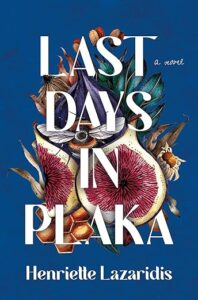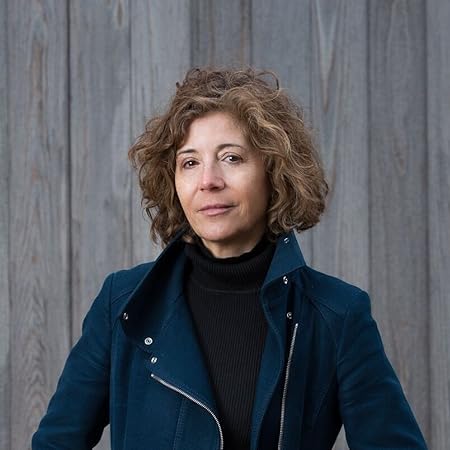Henriette Lazaridis is on the blog today to discuss her latest release LAST DAYS IN PLAKA. Welcome Henriette. Let’s start with a learning a little about you. Where are you from, where do you live? Is writing your full-time job?
I grew up in the Boston area, where I now live. I was born in the States, but my entire family is in Greece and Greek was my first language. Writing and teaching make up my workdays, along with the exciting work of co-founding a new publishing company, Galiot Press, with a writer friend and colleague.
How long have you been writing?
I suppose I’ve been writing fiction since childhood, and particularly since high school when my freshman English teacher would read and critique vignettes I churned out. I took a detour into academia after graduating from college, and taught at Harvard for ten years after getting my Ph.D. in English from the University of Pennsylvania. About eight years into my time at Harvard, I realized I had always planned to be a novelist, and I was able to make a course correction while also raising my two children. For the first time in their childhoods, I was home when they got off the bus, in theory (!) having spent the day on my writing.
What does your typical writing day look like?
The typical day changes from project to project, season to season. But let’s say my favorite typical day involves a crack-of-dawn workout (either rowing on the Charles River, or running, or something like that), and then a morning of writing. Usually, the afternoon is when I’ll do other work, or–if other work permits–I’ll type up the material I wrote longhand in the morning, editing it as I go. My favorite winter writing day begins with a pre-dawn writing session, and then the rest of the day gets under way after about 8:00 am.
Tell us about your latest release? Where the idea came from? Perhaps some fun moments, or not so fun moments?
My next novel is Last Days in Plaka, a book that came to me as two sentences, out of nowhere, before I went to sleep one night. The sentences were still there in the morning, and so I set aside the novel I’d been working on to answer the call of this new one. Last Days in Plaka is set in contemporary Athens and centers on the complicated friendship between an old Athenian woman and a young Greek-American, each woman searching for a way to give their lives meaning. Their world is the Athens of strivers, refugees, old-timers, graffiti-artists, parkour runners, churchgoers, and denizens of old cafes.
Could you share one detail from your current release with readers that they might not find in the book?
One of the settings for the novel is a rooftop cinema in the Plaka section of Athens called the Cine Paris. It’s probably the most famous of the city’s outdoor cinemas, thanks to its unobstructed view of the Acropolis, and it’s a place I’ve visited many times, to see French arthouse films or the latest rom-coms. It felt very natural to put the cinema into the story, as, like Anna my young character, I’ve often been there with people of my parents’ generation (and with my parents specifically), and loved the overlay of time periods the place evokes.
Who has been the most difficult character for you to write? Why?
The most challenging character was one of the two Ethiopian refugees who are part of a tiny church congregation led by Father Emmanouil in study of the Book of Revelation. Tamrat is a journalist who has left Addis Ababa for political reasons, and he continues to write pieces freelance in Athens, wiring money back home, and expecting to return to Addis at some point. He’s a bit grouchy, and he is on the alert for the way Athenians judge him and his friend Oumer, and assume them to be desperate, while they are not. It was challenging to be sure to write this person without succumbing to any of the assumptions Tamrat sees in those around him, and to make him a rounded character even though he’s not on stage, so to speak, for a lot of time.
If you could be one of your characters for a day which character would it be?
I think I might choose Nefeli, the wife of the priest Father Emmanouil. She’s a modern woman, with a great sense of style and a wry sense of humor. She and her husband have a good relationship of frankness combined with teasing. I’d like to see what her day to day is, when she gets rid of her two sons and meets her friends at cafes and then spends the evenings with her husband. Either Nefeli or Mel, short for Melpomene the Muse of tragedy. She’s an art student who keeps breaking up with boyfriends and then leading her new friend Anna to create graffiti art (read: revenge graffiti) on their homes.
If you could spend the day with your character, what would you do? What would that day look like?
Ha! See above: Nefeli at the coffeeshops and then hanging out with her soccer-playing priest husband.
What’s your take on research and how do you do it?
I’ll probably get this quote wrong, but Zadie Smith once said something along the lines of ‘I’m a novelist. I don’t do research, I make things up.’ Now, if you’ve read Smith’s latest, The Fraud, you know that she does do research. But I like the sentiment. I tend to look things up either for a bit at the start, or–more often–as I go, as needed. There are so many approaches, and there’s no right or wrong, but I think you have to use historical information in a novel according to the rules of that particular book. Are you telling the reader a lot? Are you requiring them to do more work of inference? Are you using the information you researched as a sort of hidden but felt background, or are you presenting that as an important part of the story?
Are there any particular authors that have influenced how you write?
I aspire to write like Kate Atkinson, but I don’t know that my work would reflect that, especially since my books are all fairly different, in style and content. And Smith, but then again who wouldn’t want to write like Zadie Smith?!
Do you have a secret talent readers would be surprised by?
I’m a solid intermediate mandolin player. I took it up finally after years of self-taught guitar and a brief stint on the fiddle (and after many more years of piano), because I have always loved the sound. I try to play every day, and I’ve taken some lessons–and need to take more!
Your favorite go to drink or food when the world goes crazy!
Coffee! French press coffee with a tiny bit of milk. Hot.
What is your writing kryptonite?
The idea of writer’s block. I understand that it’s not always easy to make progress, and I’ve certainly experienced those challenges myself. But I try to stay away from the idea that there’s such a thing as writer’s block because that sounds like some external reality that you can’t avoid, when in fact, I think you can find ways to work around it.
What is the one question you never get asked at interviews, but wish you did? Ask and answer it.
Question: What were your favorite books in childhood?
Answer: Banner in the Sky, by James Ramsey Ullman, and The Incredible Journey really stand out for me. They were the books I read and re-read. I used to imagine myself on that mountain that Rudi climbs, and I used to imagine the trek of those dogs (and cat), and feel that same bond with my own dog Scotty, my Golden Retriever, as I explored in the woods all day.
Thank you very much for joining us today, Henriette.
Readers, here’s a look at LAST DAYS IN PLAKA:
 An immersive and multifaceted novel—The Talented Mr. Ripley by way of Elena Ferrante—that explores the lies at the heart of an old woman’s identity and the desperation of a young woman’s struggle to belong.
An immersive and multifaceted novel—The Talented Mr. Ripley by way of Elena Ferrante—that explores the lies at the heart of an old woman’s identity and the desperation of a young woman’s struggle to belong.
Today’s Athens is a city of contradictions and complexity—it is grand and scruffy, ancient and modern, full of strivers, refugees and old-timers—and nowhere more so than the neighborhood of Plaka, where the Parthenon looms overhead and two women grapple with what is right and what is true, and how to live your life when you are running out of time.
Searching for connection to her parents’ heritage, Greek-American Anna works at an Athens gallery by day and makes street art by night. Irini is elderly and widowed, once well-to-do but now dependent on the charity of others. When the local priest brings the two women together, it’s not long before they form an unlikely bond. Anna’s friends can’t understand why she spends so much time with the old woman, yet Anna becomes more and more consumed by Irini’s tales of a glamorous past. As they join the priest’s tiny congregation to study the Book of Revelations in preparation for a pilgrimage to Patmos, Anna sinks deeper into Irini’s stories of an estranged daughter and lost wealth and the earthquake damage to her noble home.
Looking for revelation of her own, and driven by a sense that time is running out, Anna makes a decision that puts her in peril, exposes Irini’s web of lies, and compels Anna to confront the limits of her own forgiveness.
ABOUT THE AUTHOR:
Henriette Lazaridis is the author of three novels. Her debut, The Clover House, was a Boston Globe bestseller and a Target Emerging Authors pick. A lifelong fascination with explorer Robert Falcon Scott led her to write Terra Nova, about two fictional Antarctic explorers in 1910 and the woman who loves them both. The New York Times’ reviewer called it “ingenious.”
Her third novel, LAST DAYS IN PLAKA, is set in Athens and centers on an extraordinary friendship between two women of different generations. It will be published by Pegasus in April 2024.
Henriette earned degrees in English literature from Middlebury College, Oxford University, where she was a Rhodes Scholar, and the University of Pennsylvania. Having taught English at Harvard, she now teaches at GrubStreet in Boston. She was the founding editor of The Drum Literary Magazine and runs the Krouna Writing Workshop in northern Greece. Her essays and articles have been published in Elle, Forge, Narrative Magazine, The New York Times, New England Review, The Millions, and Pangyrus, and earned her a Massachusetts Cultural Council Artists Grant.
An avid athlete, Henriette trains on the Charles River as a competitive rower, and skis, trail runs, or cycles whenever she can. She writes about athletic and creative challenges at The Entropy Hotel on Substack.
Visit her website: www.henriettelazaridis.com
Instagram: @writerhenriette, @entropyhotel
Facebook: @HenrietteLazaridis
BUY LINKS






